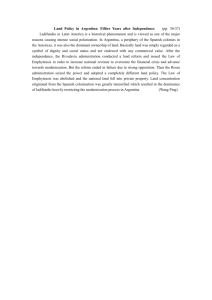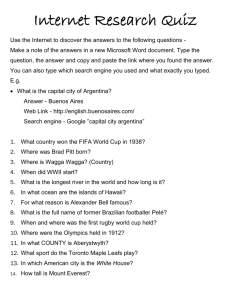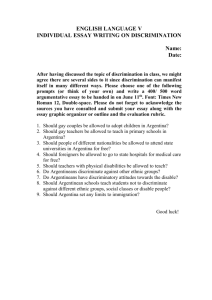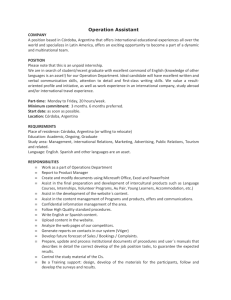ARGENTINA
advertisement
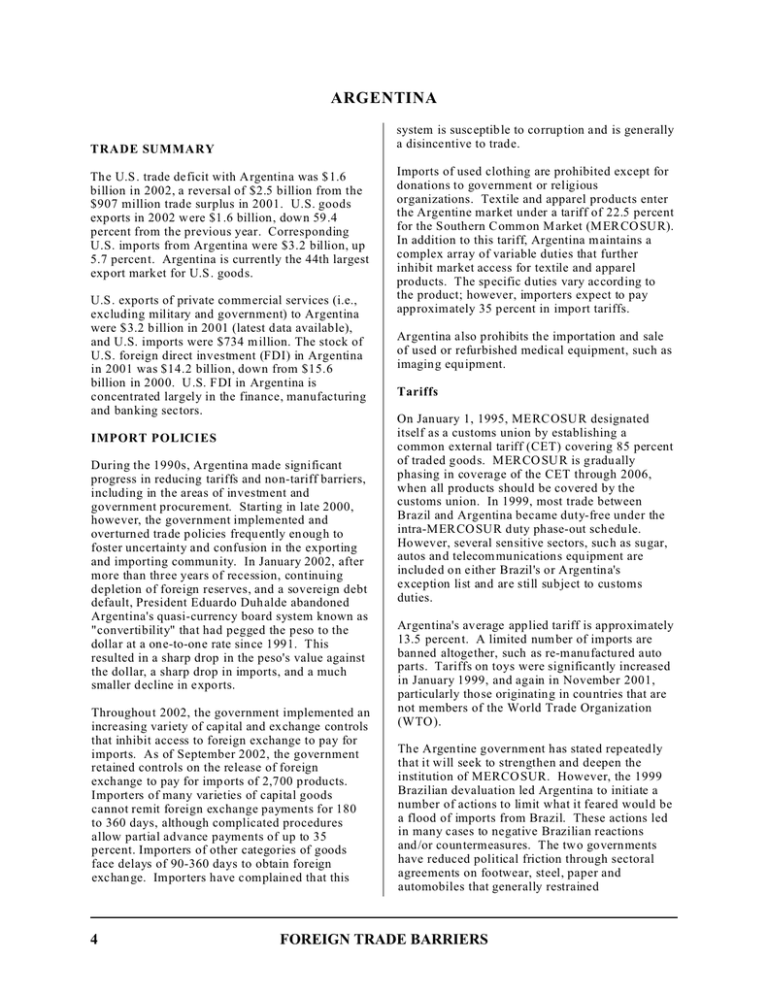
ARGENTINA ARGENTINA TRADE SUMMARY The U.S . trade deficit with Argentina was $1.6 billion in 2002, a reversal of $2.5 billion from the $907 million trade surplus in 2001. U.S. goods exports in 2002 w ere $1.6 billion, down 59.4 percent from the previous year. Corresponding U.S. imports from Argentina were $3.2 billion, up 5.7 percent. Argentina is currently the 44th largest export market for U.S . goods. U.S. exports of private comm ercial services (i.e., excluding military and government) to Argentina were $3.2 billion in 2001 (latest data available), and U.S. imports were $734 m illion. The stock of U.S. foreign direct investment (FDI) in Argentina in 2001 was $14.2 billion, down from $15.6 billion in 2000. U .S. FDI in Argentina is concentrated largely in the finance, manufacturing and banking sectors. IMPORT POLICIES During the 1990s, Argentina made significant progress in reducing tariffs and non-tariff barriers, including in the areas of investment and government procurement. Starting in late 2000, however, the government implemented and overturned trade policies frequ ently en ough to foster uncertainty and confusion in the exporting and importing community. In January 2002, after more than three years of recession, continuing depletion of foreign reserves, and a sovereign debt default, President Eduardo Duhalde abandoned Argentina's quasi-currency board system known as "convertibility" that had pegged the peso to the dollar at a one-to-one rate sin ce 1991. This resulted in a sharp drop in the peso's value against the dollar, a sharp drop in imports, and a much smaller decline in exports. Throughout 2002, the government implemented an increasing variety of cap ital and exchange controls that inhibit access to foreign exchange to pay for imports. As of September 2002, the government retained controls on the release of foreign exchange to pay for imp orts of 2,700 products. Importers of many varieties of capital goods cannot remit foreign exchange payments for 180 to 360 days, although complicated procedures allow partial advance payments of up to 35 percent. Importers of other categories of goods face delays of 90-360 days to obtain foreign exchange. Importers have complained that this 4 system is susceptible to corruption and is generally a disincentive to trade. Imports of used clothing are prohibited except for donations to government or religious organizations. Textile and apparel products enter the Argentine market under a tariff of 22.5 percent for the Southern Comm on M arket (MER CO SU R). In addition to this tariff, Argentina maintains a complex array of variable duties that further inhibit market access for textile and apparel products. The sp ecific duties vary according to the product; however, importers expect to pay approximately 35 percent in import tariffs. Argentina also prohibits the importation and sale of used or refurbished medical equipment, such as imaging equipment. Tariffs On January 1, 1995, MERCOSU R designated itself as a customs union by establishing a common external tariff (CET) covering 85 percent of traded goods. MER CO SU R is gradu ally phasing in coverage of the CET through 2006, when all products should be covered by the customs union. In 1999, most trade between Brazil and Argentina became duty-free under the intra-MER CO SU R duty phase-out schedule. However, several sensitive sectors, such as sugar, autos and telecom munications equipment are inclu ded on either Brazil's or Argentina's exception list and are still subject to customs duties. Argentina's average applied tariff is approximately 13.5 percent. A limited num ber of imports are banned altogether, such as re-manufactured auto parts. Tariffs on toys were significantly increased in January 1999, and again in November 2001, particularly those originating in countries that are not members of the World Trade Organization (WTO ). The Argentine government has stated repeatedly that it will seek to strengthen and deepen the institution of MERCO SUR. However, the 1999 Brazilian devaluation led Argentina to initiate a number of actions to limit what it feared would be a flood of imports from Brazil. These actions led in many cases to negative Brazilian reactions and/or countermeasures. The tw o governments have reduced political friction through sectoral agreements on footwear, steel, paper and automobiles that generally restrained FOREIGN TRADE BARRIERS ARGENTINA intra-ME RCOSU R trade. Friction was further reduced in 2002 w hen both countries dropped anti-dumping and other measures affecting trade in textiles and certain food products. Custom s Procedures Argentina abides by the WTO Agreement on Customs Valuation. In October 2001, it eliminated a pre-shipment inspection (PSI) regime that U.S. exporters generally considered an obstacle to legitimate trade. Argentina h as import monitoring mechanisms, similar to an import-licensing regime, which affect rough ly one-fifth of its imp orts, principally textiles, toys and footwear. U.S. firms complain of cumb ersome certificate of origin requirements, particularly in the electronics and textile sectors. The United States continues to urge A rgentina to reform its customs regime and to improve the rules-based trade environment in Argentina. STANDARDS, TESTING, LABELING AND CERTIFICATION Agricultural Pro ducts In 2002, Argentina prohibited the import of bovine sweetbreads from the United States claiming the "possible existence of Bovine S pongiform Encephalophy (BSE) in the United States." However, the measure was not based on scientific evidence as required under the Sanitary and Phytasanitary Agreement. The United States, Canada and the European U nion raised their concerns with the Argentine measure at the November 2002 meeting of the WTO Sanitary and Phytosanitary Comm ittee. In 20 02, Argentina also banned the import of all chicken prod ucts from the U nited States. Th is decision was based on an outbreak of Newcastle Disease in the Los Angeles area. Although there was no import of chicken meat from the United States in 2002, this ban affected the import of chicken cartilage, worth $5 million annually. Argentina has continued to delay issuing the final authorization for imports of additional citrus fruit, pears, and cherries from the U.S. In addition, unjustified restrictions remain in place for swine genetics, an issue that remains difficult to address due to Argentina's focus on controlling foot-and-mouth disease. Because of unscientific phytosanitary prohibitions, seed potatoes are also unable to enter the Argentine market. In addition, in October 200 2, the A rgentina's phytosanitary and food safety agency, SENASA, issued a resolution that could require audits of the animal and plant health systems of countries that export animal and plant products to Argentina. As a result, Argentina could ban all imports of plant material in "phytosanitary risk category 2" as of January 2003 if it is not accompanied by documentation addressing phytosanitary practices in the country of origin. Non-agricultural Products IRAM, Argentina's standards institute, bases some of its voluntary standards on international standard s. In addition, IRA M stand ards are in some cases compatible with U.S. or European standard s. In general, Argentine buyers usually accept products that meet U.S. standards as well as U.S. product certifications and laboratory testing. In early 1998, however, Argentina began mandating compliance with new safety certifications on a wide range of products. Argentina has issued regulations that affect U.S. exports of low voltage electrical products (household appliances, electronics products and electrical materials), toys, covers for dangerous products, gas products, construction steel, personal protective equipment and elevators. The procedures for compliance often appear inconsistent, redundant and non-transparen t. Regulations that require product re-testing are particularly cumbersome and costly and are especially problematic for small and medium-sized U.S. companies. Argentina's certificate of origin regulations require separate certificates for each of the countries involved in manufacturing the various components of a final prod uct, w hich is often impractical and costly. In some cases, Argentina has failed to fulfill the notification and comment requirements of the WTO Agreement on Technical Barriers to Trade (T BT ) in its implementation of these measures. The United States has raised this issue with the Argentine Governm ent in G eneva and bilaterally. INTELLECTUAL PROPERTY RIGHTS (IPR) PROTECTION Patents Argentina's lack of adequate and effective patent protection has been a long-standing irritant in the bilateral trade relationship. Argentina is on the Special 301 Priority Watch List. Many of the FOREIGN TRADE BARRIERS 5 ARGENTINA WT O A greement on Trade Related Intellecutural Property Rights (TRIPS) inconsistencies in the Argentine patent law w ere not previously actionable in the WTO , because Argentina availed itself of the developing country transition period. However, most of Argentina's TRIPS obligations came into force on January 1, 2000 . The National Intellectual Property Institute (IN PI) started to approve pharm aceutical patents in October 2000. INPI has been extremely slow since that time in issuing pharmaceutical patents to products with commercial value. Bilateral trade negotiations between the United States and Argentina did not resolve the issue of intellectual property protection of confidential and proprietary data developed by pharmaceutical companies and submitted to INPI. In April 2002, negotiations between the governments of the United States and Argentina clarified aspects of the latter's intellectual property system, such as provisions related to the patentability of microorganisms and its import restriction regime. Argentina also agreed to amend its patent law so as to provide protection for products obtained from a process patent and to ensure that preliminary injunctions are available in intellectual property court proceedings, among other steps. Finally, the United States retains its right to seek resolution on the outstanding issues that remain, including data protection, under the WTO dispute settlement mechanism. INPI's board has changed several times over the last several years, most recently in June 2002. The organization is chronically short of funds, which has impaired its efforts to modernize and improve service. The U .S. pharmaceutical industry estimates that Argentina's lack of ad equate pharmaceutical patent protection results in losses of over $600 million a year. use in government offices. Enforcement of copyrights on recorded music, videos, books and computer software remains inconsistent. Although Argentine Customs and other governm ent authorities generally cooperate with industry efforts to stop shipments of pirated merch andise, inadequate resources and slow court procedures have hampered the effectiveness of enforcement efforts. The legal framework regarding Internet piracy provides few incentives to investigate and punish those who post infringing materials. Inadequate border controls, particularly at the P araguayan/Brazilian border, further contribute to the regional circulation of pirated goods. The U.S. copyright industry estimates annual losses due to copyright infringement at over $275 m illion. Tradem arks U.S. companies report that the process of registering trademarks generally takes over five months. However, enforcement is relatively efficien t and reliable once a tradem ark is registered. SERVICES BARRIERS Although Argentina enacted liberalization in the service sector as part of its broader econom ic reform p rogram in the 1990 s, some barriers continue to exist. For example, the Argentine Governm ent obliges cable/pay television operators to register their programming with a government body. In addition, restrictions regarding the showing, printing and dubbing of films have burdened U .S. exports, as has the practice of charging ad valorem customs duties based on the value of authors' rights, rather than solely on the value of the physical materials being imported, which is the W TO standard. Copyrights Argentina's copyright laws provide generally good protection. Argentina adopted legislation in 1999 to ratify the W orld Intellectual Property Organization (WIPO) Copyright Treaty and the WIPO Performances and Phonograms Treaty. To better protect software, Argentina promulgated legislation in November 1998 establishing software piracy as a criminal offense, thus avoiding problems generated by previous court rulings. D espite vigorous efforts by the software industry, A rgentina has yet to fully comply with an agreem ent to legalize unlicenced software in 6 In the WTO , Argentina has committed to allow foreign suppliers of non-insurance financial services to establish all forms of commercial presence and has committed to provide substantially full market access and national treatment to foreign suppliers of non-insurance financial services. The only significant remaining issue is lending limits for foreign bank branches that are based on local paid-in capital, not parent bank capital. This effectively removes the rationale for establishing in branch form. T his issue is now moot due to the ongoing banking crisis that began in December 2001 with the FOREIGN TRADE BARRIERS ARGENTINA freezing of bank accounts and the subsequent devaluation and asymmetric pesification of deposits, loans and other assets. INVESTMENT BARRIERS In line with WT O rules, Argentina notified measures inconsistent with its obligations under the WTO Agreement on Trade-Related Investment Measures (TRIM S). These measures deal with local content and trade balancing in the automotive industry. Proper notification allowed developing-coun try WTO members to m aintain such measures for a five-year transitional period, ending January 1, 2000. In November 2001, the WTO granted a four-year extension to the TRIM S transitional period. This will allow Argentina to maintain minimum content requirem ents until December 31, 2003. The 2002 Brazil-Argentina agreement on auto trade includes an article that allows for continued minimum content requirements on Argentine-manufactured vehicles until 2005. The United States continues to monitor closely the evolution of Argentine trade measures in this sector. ELECTRONIC COMMERCE Argentina has made a broad range of value-added and basic telecommunications General Agreement on Trade in Services commitments that have helped su pport the development of electron ic commerce. Argentina has taken steps to lower the cost of Internet usage and have show n interest in the U.S. electronic commerce initiatives in the Free Trade Area of the Americas and WTO. The United States and Argentina have signed a bilateral initiative to promote the growth of electronic commerce. Despite supporting electronic commerce, Argentina does not participate in the WTO Information Technology Agreement (ITA). In addition, Argentina does not allow the use of electron ically produ ced air waybills, slowing the customs processing of critical just-in-time shipments an d interfering with Argentina's ability to conduct electronic commerce transactions. FOREIGN TRADE BARRIERS 7
